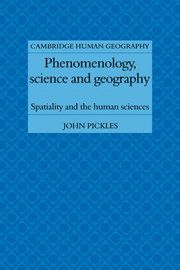Book contents
- Frontmatter
- Contents
- Preface
- Acknowledgements
- 1 Introduction
- PART I GEOGRAPHY AND TRADITIONAL META-PHYSICS
- 2 Geographical discourse and its central themes
- PART II GEOGRAPHY AND PHENOMENOLOGY
- PART III PHENOMENOLOGY AND THE QUESTION OF HUMAN SCIENCE
- PART IV HUMAN SCIENCE, WORLDHOOD AND SPATIALITY
- Notes
- References
- Index
2 - Geographical discourse and its central themes
Published online by Cambridge University Press: 07 September 2010
- Frontmatter
- Contents
- Preface
- Acknowledgements
- 1 Introduction
- PART I GEOGRAPHY AND TRADITIONAL META-PHYSICS
- 2 Geographical discourse and its central themes
- PART II GEOGRAPHY AND PHENOMENOLOGY
- PART III PHENOMENOLOGY AND THE QUESTION OF HUMAN SCIENCE
- PART IV HUMAN SCIENCE, WORLDHOOD AND SPATIALITY
- Notes
- References
- Index
Summary
Basic concepts of science and the method appropriate to ontology
In every scientific discipline and in every theoretical perspective certain basic concepts determine the way in which we get an initial understanding of the subject-matter which underlies all the objects a science takes as its theme. All positive investigation is guided by this understanding, yet it is generally taken for granted. Only on the basis of such concepts and such perspectives do facts have the meaning they do, and, in the ideal case, do geographers, sociologists, anthropologists, and other scientists, constitute the various disciplines. Only by clarifying these basic concepts and making them transparent do the sciences become genuinely grounded. “But since every such area is itself obtained from the domain of entities themselves, this preliminary research, from which the basic concepts are drawn, signifies nothing else than an interpretation of those entities with regard to their basic state of Being” (Heidegger, 1927, 10).
Geographers have been aware of these fundamental concepts, and occasionally have attempted to make them explicit. More recently there have been some attempts to provide a theoretical basis for questioning such taken-for-granted concepts and perspectives, thereby making them problematical. The manner of such reflections has, however, generally been expository, and only sometimes critical (Gregory, 1978a). Until recently criticism has generally not been philosophical as such, but has remained within the realm of the sciences themselves, where texts are taken at face value and arguments constructed from textual, rather than ontological, analyses.
- Type
- Chapter
- Information
- Phenomenology, Science and GeographySpatiality and the Human Sciences, pp. 15 - 38Publisher: Cambridge University PressPrint publication year: 1985

